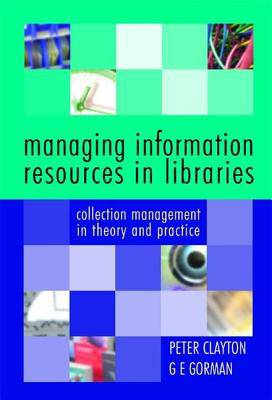
- Retrait gratuit dans votre magasin Club
- 7.000.000 titres dans notre catalogue
- Payer en toute sécurité
- Toujours un magasin près de chez vous
- Retrait gratuit dans votre magasin Club
- 7.000.000 titres dans notre catalogue
- Payer en toute sécurité
- Toujours un magasin près de chez vous
Managing Information Resources in Libraries
Collection Management in Theory and Practice
Peter Clayton, G E GormanDescription
ReadershipWritten in a straightforward and accessible way, this is essential reading for acquisitions librarians and collection managers in all types of libraries, as well as for students of library and information studies.
Libraries and information services are being transformed by the increasing availability of electronic information. The management of information resources in libraries is of greater, not lesser importance in the digital world. Librarians are well placed to provide leadership in the new century as they draw on enduring principles and updated skills to provide organized access to worthwhile information in order to meet the needs of library clients.
Developments in this area have been so rapid in the last few years that no current work on collection management covers it adequately. This book fills that gap by presenting an overall view of the information resources that library clients are likely to require in the 21st century. It is an accessible practice-based guide encompassing all areas of collection management, but with a particular focus upon what is new or different from traditional approaches. Integrating discussion of available electronic information sources throughout, it covers:
- collection management in the organizational context
- collection development policies
- library co-operation and networking
- selection principles and resources
- principles of acquisition, access and licensing
- budget management
- collection evaluation and review
- preservation and weeding of library resources.
The book features many examples and case studies, together with focus questions at the start of each chapter and suggestions for further reading at the end. It also includes a detailed annotated bibliography.
Readership: Written in a straightforward and accessible way, this is essential reading for acquisitions librarians and collection managers in all types of libraries, as well as for students of library and information studies.
Spécifications
Parties prenantes
- Auteur(s) :
- Editeur:
Contenu
- Nombre de pages :
- 288
- Langue:
- Anglais
Caractéristiques
- EAN:
- 9781856045810
- Date de parution :
- 02-07-06
- Format:
- Livre broché
- Format numérique:
- Trade paperback (VS)
- Dimensions :
- 156 mm x 233 mm
- Poids :
- 453 g







